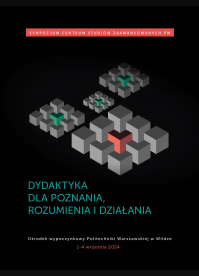Symposium "Didactics for cognition, understanding and action",1-4.09.2024
On 1-4 September 2024, a symposium entitled 'Didactics for Knowing, Understanding and Acting' was held at the PW Leisure Centre in Wilga, dedicated to discovering new opportunities, but also identifying weaknesses and challenges in the didactic processes of universities. Issues of how to effectively educate - teach and scientifically activate the modern student - how to redesign processes and overcome the difficulties that the complex and heterogeneous social reality poses for academic didactics were submitted for consideration. The main core of the Symposium's participants were the winners of teaching grant competitions at the Warsaw University of Technology - members of teams who saw the potential for change and made an effort to modernise the teaching sphere at the Warsaw University of Technology.
The Teaching Grants programme, which has been running for three years, has highlighted the many weaknesses in teaching that the university faces. It has also shown the potential of many research teams to be creative in their teaching and to take on new and challenging issues in modern science. Among the three aspects of education: information, project and problem-based learning, the dominant form is often one-sided information of the participants in the didactic process. In contrast, the level of project engagement does not bring out sufficiently advanced creative possibilities. The balance between 'innovative methods', which in themselves can dominate the whole process, and tedious 'traditional teaching' is difficult to find. It is also important to remember how important and complex problem-based didactics is. It requires a high degree of individualisation in education and uniquely original methods.
The symposium provided an opportunity for the exchange of ideas and discussion. We hope that the presentation of personal experiences and reflections, including those of the winners of Teaching Grants, will allow us to better understand many phenomena in the sphere of teaching at our University and to formulate practical conclusions for better and more effective implementation of the University's teaching mission.
We invite you to read the Symposium materials, where you will find abstracts of the speeches delivered during the meeting.



